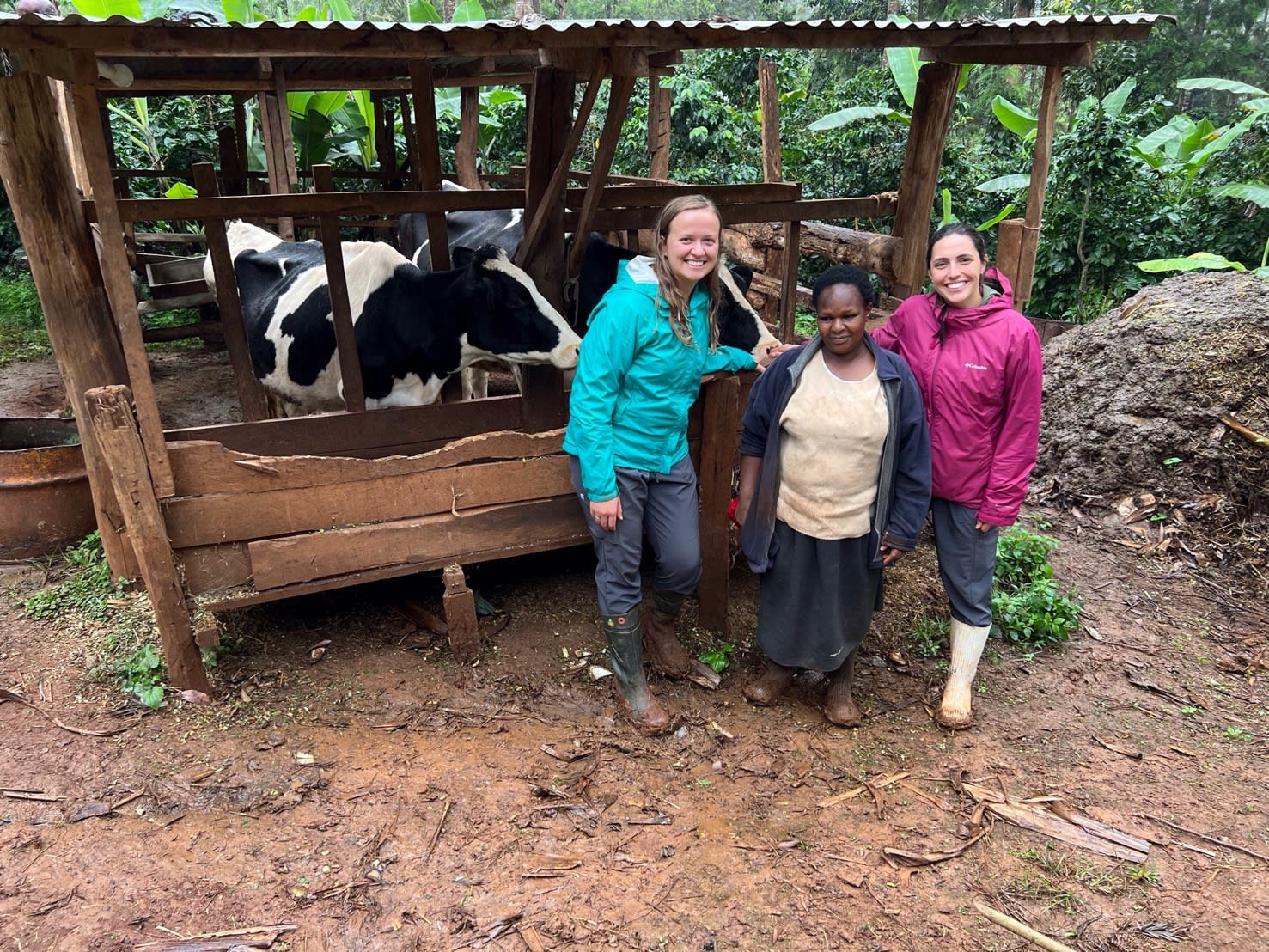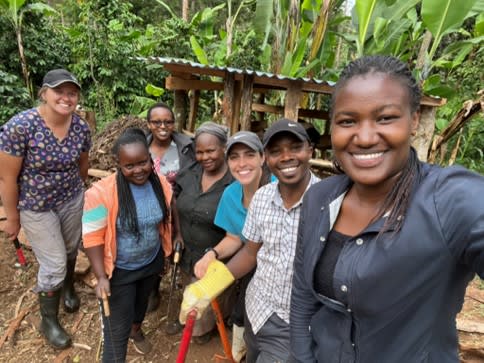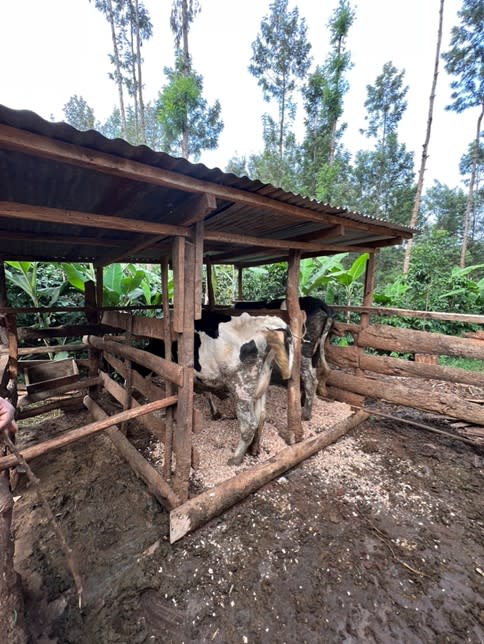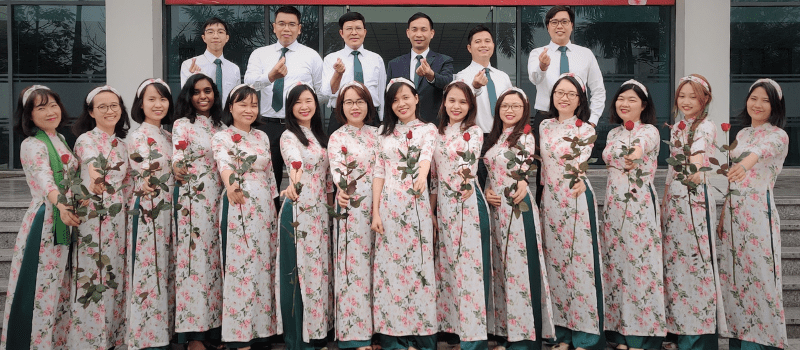“We really enjoyed getting to know Margaret and her family and spending time on her farm... it was very rewarding to be able work together and create a more comfortable space for her cows and calf and seeing the results with more milk production."
From May to August, Alanna Dudych, a third-year veterinary student at The Western College of Veterinary Medicine, and Vanessa Oliver, a third-year veterinary student at The University of Guelph’s Ontario Veterinary College, completed a volunteer placement in Kenya through VWB/VSF’s Global VETS Young Volunteer Program (YVP), a program generously supported by Global Affairs Canada. While there, they connected with local farmers to help optimize the health of their dairy cattle, feeding practices, and farm management, working with them to implement more sustainable and productive farming practices.
Working with VWB/VSF’s Kenyan partner, Mukurwe-ini Wakulima Dairy Ltd. (MWDL), Alanna and Vanessa had the opportunity to connect with farmer, Margaret Kambura, and her family, to provide training and advice on the Kambura’s feeding and farm management practices.

(L-R) Alanna, Margaret, and Vanessa visitng the Kambura's dairy farm in Kenya.
Updates to the Kambura’s farm had become a financial and physical burden for the family, and when first arriving at their property, the YVP team and other partners noticed that one cow was without a stall and the current bedding and environment needed alterations. They also evaluated the cows’ milk production.
“Cow comfort and mastitis training [helping to prevent inflammation, infection, and reduced milk production in cow’s udders] are vital for farmers in order to improve animal welfare and the productivity of their farms,” explained Alanna.
Together, the team decided to tackle the farm’s primary challenge – inadequate space for both cows to lie down. To address this, the YVP team decided to build a calf shed and repair the existing cow stalls to ensure all animals would have enough space to comfortably rest. This would not only help the cows digest properly, but also help them utilize their forage more efficiently, produce more milk, and provide a financial and nutritional advantage for the Kambura’s and their community.
 The VETS volunteers & Margaret at the Kambura farm.
The VETS volunteers & Margaret at the Kambura farm.
Working together, Alanna, Vanessa, collaborated with other VWB VETS volunteers, including Nafhtari Wanjiku, Daisy Jerob, and Maureen Tanyai, to create an action plan for the Kamburas. “Margaret and her husband sourced the floor, siding, and roof materials needed for construction of the shed,” explained Vanessa, adding that the YVP team provided nails, wood shavings for bedding, and the tools required to build. “Margaret’s husband cleared an area for the calf shed and dug holes for the support beams prior to our arrival. Over the next few days, our team worked together to build the calf shed and adjust the existing stalls,” said Vanessa. Ultimately, these adjustments included removing boards at the front of the stall to create more lunge space, on the sides to make the stalls wider, adding a neck rail to help keep the stall cleaner, and tilling the existing soil to make it softer. Wood shavings were added to make the bedding more absorbent and softer for the cows to rest on.
“A California Mastitis Test (CMT) was performed on the lactating cow,” said Vanessa, adding that because “the cow was positive for subclinical mastitis, we advised Margaret to have the paraveterinarian further evaluate the cow and treat it for mastitis.” The team also discussed the importance of always providing forage and clean water for the cows, along with measures to improve calf health.
Once these changes were implemented, Margaret noted significant differences in the cows’ behaviours and production. For example, their milk production almost doubled, increasing from about 3-4 litres daily to about 6.5-7 litres per day. With cleaner stalls, Margaret and her family also had a reduced workload in the cow sheds, which enabled them to place their efforts into other needed areas on the farm. With the introduction of nutritional calf pellets, the calf became much healthier and more likely to become an additional milking cow in the future.

The Kambura farm cow stalls, following upgrades.
“Margaret was very happy with results from these changes,” said Alanna. “She was motivated to make more changes on her farm, like purchasing Mastrite for teat dipping post-milking to reduce the incidence of mastitis on her farm. She also switched to calf pencils to provide adequate nutrition for her growing calf at the appropriate life stage,” Alanna added.
Margaret also indicated that she’d like to continue attending training sessions provided by VWB and the MWDL and share her results and changes she made with the community. “The seminars and training are vital for my knowledge,” said Margaret.
“We really enjoyed getting to know Margaret and her family and spending time on her farm,” said Alanna. “It was very rewarding to be able work together and create a more comfortable space for her cows and calf and seeing the results with more milk production,” Vanessa added.
Ultimately, knowledge of these farm management practices can extend beyond just the Kambura’s farm and help local neighbours and community members who may be experiencing similar challenges on their farms. By providing access to animal health services and training, the VETS YVP program can help communities across the globe achieve healthy relationships with animals and, by doing so, build healthier communities.
Interested in volunteering with our VETS program? We're always looking for qualified volunteers. Learn more about our current volunteer openings at vetswithoutborders.ca/volunteers. Or reach out to volunteers@vetswithoutborders.ca for more information.




